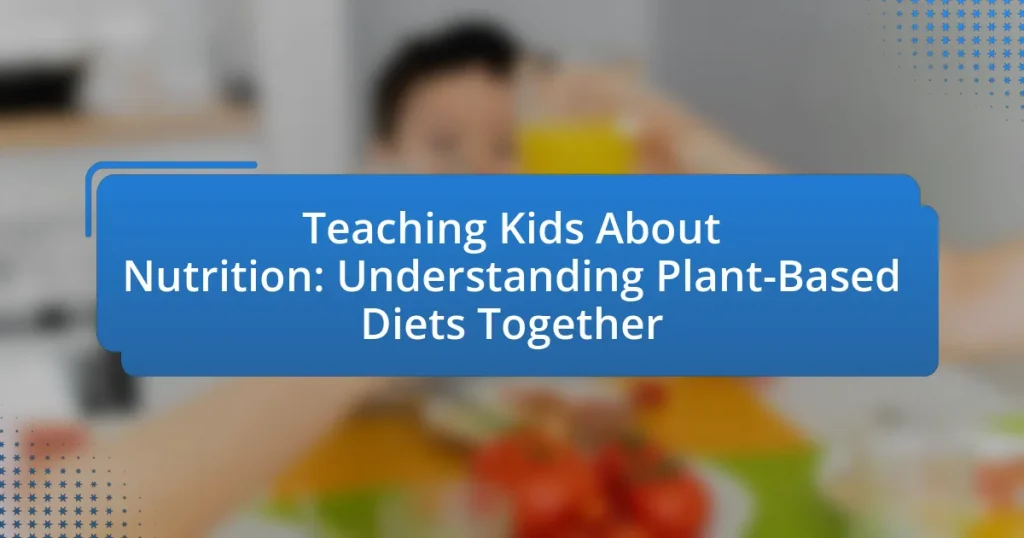The article focuses on the importance of nutrition for children, particularly emphasizing the benefits of plant-based diets. It outlines how proper nutrition supports physical growth, cognitive development, and overall health, highlighting essential nutrients necessary for children’s well-being. The article also discusses the impact of poor nutrition on children’s physical and mental health, the role of parents in teaching kids about nutrition, and practical strategies for encouraging a plant-based diet. Additionally, it addresses common misconceptions, challenges families may face during dietary transitions, and the long-term health benefits associated with plant-based eating.

What is Nutrition and Why is it Important for Kids?
Nutrition is the process by which organisms obtain and utilize food for growth, energy, and overall health. It is crucial for kids because proper nutrition supports their physical development, cognitive function, and immune system. For instance, children require essential nutrients such as proteins, vitamins, and minerals to build strong bones and muscles, enhance brain development, and prevent chronic diseases. Research indicates that a balanced diet during childhood can lead to improved academic performance and better health outcomes later in life.
How does nutrition impact a child’s growth and development?
Nutrition significantly impacts a child’s growth and development by providing essential nutrients necessary for physical and cognitive advancement. Adequate nutrition supports the formation of strong bones, muscles, and organs, while also influencing brain development and function. For instance, a study published in the “American Journal of Clinical Nutrition” found that children who consume a balanced diet rich in fruits, vegetables, whole grains, and proteins exhibit better growth patterns and cognitive performance compared to those with poor dietary habits. Furthermore, deficiencies in key nutrients such as iron, calcium, and vitamins can lead to stunted growth and developmental delays, highlighting the critical role of nutrition in a child’s overall health and future potential.
What are the key nutrients essential for children’s health?
Key nutrients essential for children’s health include protein, carbohydrates, fats, vitamins, and minerals. Protein supports growth and development, while carbohydrates provide energy for daily activities. Healthy fats are crucial for brain development, and vitamins and minerals, such as calcium and iron, are vital for bone health and overall bodily functions. Research indicates that a balanced intake of these nutrients is necessary for optimal growth, cognitive function, and immune support in children. For instance, the American Academy of Pediatrics emphasizes the importance of a varied diet rich in these nutrients to promote healthy childhood development.
How can poor nutrition affect a child’s physical and mental well-being?
Poor nutrition can significantly impair a child’s physical and mental well-being by leading to health issues such as obesity, malnutrition, and developmental delays. Physically, inadequate intake of essential nutrients can result in weakened immune systems, making children more susceptible to illnesses. For instance, a study published in the Journal of Nutrition found that children with poor dietary habits are at a higher risk of developing chronic diseases like diabetes and heart disease later in life.
Mentally, poor nutrition is linked to cognitive deficits and emotional problems. Research from the American Journal of Psychiatry indicates that children who consume diets low in fruits, vegetables, and whole grains are more likely to experience anxiety and depression. This connection underscores the importance of a balanced diet for both physical health and mental stability, highlighting how essential nutrients contribute to brain function and emotional regulation.
What role does a plant-based diet play in children’s nutrition?
A plant-based diet plays a crucial role in children’s nutrition by providing essential nutrients necessary for growth and development. This type of diet is rich in vitamins, minerals, fiber, and antioxidants, which support overall health and can reduce the risk of chronic diseases. Research indicates that children who consume a plant-based diet often have higher intakes of dietary fiber and lower intakes of saturated fat, contributing to healthier body weight and improved metabolic health. For instance, a study published in the Journal of the American Dietetic Association found that vegetarian children had a lower prevalence of obesity compared to their non-vegetarian peers. This evidence underscores the importance of incorporating plant-based foods into children’s diets for optimal nutrition.
What are the main components of a plant-based diet?
The main components of a plant-based diet include fruits, vegetables, whole grains, legumes, nuts, and seeds. These components provide essential nutrients, fiber, and antioxidants that support overall health. Research indicates that diets rich in these foods can reduce the risk of chronic diseases such as heart disease and diabetes, as evidenced by a study published in the Journal of the American College of Cardiology, which found that higher consumption of plant-based foods is associated with lower cardiovascular risk.
How does a plant-based diet compare to other dietary options for kids?
A plant-based diet for kids is associated with numerous health benefits compared to other dietary options, such as omnivorous or high-meat diets. Research indicates that children following a plant-based diet tend to have lower risks of obesity, type 2 diabetes, and heart disease due to higher intakes of fruits, vegetables, whole grains, and legumes, which are rich in essential nutrients and fiber. A study published in the journal Nutrients found that plant-based diets can provide adequate protein and essential vitamins when well-planned, supporting healthy growth and development in children. In contrast, diets high in processed meats and sugars can lead to negative health outcomes, including increased inflammation and poor metabolic health. Thus, a plant-based diet not only promotes better overall health but also encourages lifelong healthy eating habits in children.

How Can Parents Teach Kids About Nutrition Effectively?
Parents can teach kids about nutrition effectively by involving them in meal planning and preparation, which fosters a hands-on understanding of healthy eating. Engaging children in selecting fruits, vegetables, and whole grains helps them learn about the nutritional value of different foods. Research indicates that children who participate in cooking activities are more likely to make healthier food choices and develop positive attitudes toward nutritious foods. For instance, a study published in the Journal of Nutrition Education and Behavior found that children who were involved in cooking classes showed increased knowledge about nutrition and improved dietary habits.
What strategies can parents use to introduce nutrition concepts to children?
Parents can introduce nutrition concepts to children by engaging them in hands-on cooking activities. Involving children in meal preparation allows them to learn about different food groups, portion sizes, and the importance of balanced meals. Research shows that children who participate in cooking are more likely to try new foods and develop healthier eating habits. For example, a study published in the Journal of Nutrition Education and Behavior found that children who helped prepare meals were more inclined to consume fruits and vegetables. Additionally, parents can use educational games and apps focused on nutrition to make learning interactive and fun, reinforcing the concepts in an engaging manner.
How can cooking together enhance kids’ understanding of nutrition?
Cooking together enhances kids’ understanding of nutrition by providing hands-on experience with food preparation and ingredient selection. This interactive process allows children to learn about the nutritional value of various ingredients, such as fruits, vegetables, grains, and proteins, while also understanding portion sizes and balanced meals. Research indicates that children who participate in cooking activities are more likely to make healthier food choices and develop a positive attitude towards nutritious foods. For instance, a study published in the Journal of Nutrition Education and Behavior found that children who engaged in cooking classes showed increased knowledge of nutrition and improved dietary habits.
What resources are available for teaching kids about healthy eating?
Resources available for teaching kids about healthy eating include interactive websites, educational apps, cookbooks, and community programs. Websites like ChooseMyPlate.gov provide age-appropriate information on nutrition, while apps such as “Fooducate” help kids learn about food choices through gamification. Cookbooks specifically designed for children, like “The Complete Cookbook for Young Chefs” by America’s Test Kitchen, offer simple recipes that promote healthy eating habits. Additionally, community programs, such as those offered by local health departments or schools, often include hands-on activities and workshops that engage children in learning about nutrition. These resources collectively support the goal of instilling healthy eating habits in children.
How can parents encourage kids to embrace a plant-based diet?
Parents can encourage kids to embrace a plant-based diet by involving them in meal planning and preparation. Engaging children in choosing recipes and cooking meals fosters interest and ownership over their food choices. Research indicates that children who participate in cooking are more likely to try new foods, including fruits and vegetables. Additionally, parents can introduce plant-based foods gradually, making meals colorful and appealing, which can enhance acceptance. Studies show that positive exposure to diverse foods increases the likelihood of children adopting healthier eating habits.
What are some fun and engaging plant-based recipes for kids?
Fun and engaging plant-based recipes for kids include colorful vegetable wraps, fruit and veggie skewers, and homemade pizza with a variety of plant-based toppings. Vegetable wraps can be made using whole grain tortillas filled with hummus, shredded carrots, spinach, and bell peppers, making them visually appealing and nutritious. Fruit and veggie skewers allow kids to assemble their own snacks using a mix of cherry tomatoes, cucumber slices, and grapes, promoting creativity and hands-on involvement. Homemade pizza can be customized with a whole wheat crust topped with tomato sauce, nutritional yeast, and an array of vegetables like mushrooms, zucchini, and olives, encouraging kids to explore different flavors while learning about healthy eating. These recipes not only provide essential nutrients but also make cooking a fun and interactive experience for children.
How can parents address common misconceptions about plant-based diets?
Parents can address common misconceptions about plant-based diets by providing accurate information and resources. For instance, they can explain that plant-based diets can meet nutritional needs when well-planned, as supported by the Academy of Nutrition and Dietetics, which states that appropriately planned vegetarian and vegan diets are healthful and nutritionally adequate. Additionally, parents can encourage open discussions about food choices, highlighting the benefits of plant-based eating, such as lower risks of chronic diseases and environmental sustainability. By using credible sources, such as nutrition textbooks or reputable health organizations, parents can effectively dispel myths and foster a positive understanding of plant-based diets among their children.

What are the Benefits of Plant-Based Diets for Children?
Plant-based diets offer numerous benefits for children, including improved nutrition, better weight management, and enhanced overall health. These diets are rich in fruits, vegetables, whole grains, and legumes, which provide essential vitamins, minerals, and fiber necessary for growth and development. Research indicates that children consuming plant-based diets tend to have lower risks of obesity, type 2 diabetes, and heart disease due to the lower saturated fat content and higher nutrient density of plant foods. Additionally, a study published in the Journal of the American Dietetic Association found that children on plant-based diets often have higher intakes of antioxidants and phytochemicals, which support immune function and reduce inflammation.
How do plant-based diets contribute to long-term health in children?
Plant-based diets contribute to long-term health in children by providing essential nutrients while reducing the risk of chronic diseases. These diets are rich in fruits, vegetables, whole grains, and legumes, which are high in vitamins, minerals, and fiber. Research indicates that children who consume plant-based diets have lower rates of obesity, type 2 diabetes, and cardiovascular diseases. A study published in the Journal of the American Dietetic Association found that plant-based diets are associated with improved body mass index (BMI) and better overall health outcomes in children. This evidence supports the notion that a well-planned plant-based diet can promote healthy growth and development while minimizing health risks.
What specific health benefits can children gain from a plant-based diet?
Children can gain numerous health benefits from a plant-based diet, including improved nutrient intake, better weight management, and enhanced digestive health. A plant-based diet is rich in fruits, vegetables, whole grains, and legumes, which provide essential vitamins, minerals, and fiber. Research indicates that children consuming plant-based diets often have lower risks of obesity, type 2 diabetes, and cardiovascular diseases due to the lower saturated fat content and higher antioxidant levels found in plant foods. Additionally, a study published in the Journal of the American Dietetic Association found that children on plant-based diets have higher intakes of dietary fiber, which supports healthy digestion and can prevent constipation.
How can a plant-based diet support environmental sustainability?
A plant-based diet supports environmental sustainability by significantly reducing greenhouse gas emissions associated with animal agriculture. Research indicates that livestock production is responsible for approximately 14.5% of global greenhouse gas emissions, primarily methane and nitrous oxide, which are far more potent than carbon dioxide. Transitioning to a plant-based diet can lower an individual’s carbon footprint, as plant foods generally require less energy, land, and water to produce compared to animal products. For instance, producing one kilogram of beef requires about 15,000 liters of water, while producing one kilogram of vegetables requires only about 300 liters. This shift not only conserves natural resources but also helps mitigate climate change, making plant-based diets a crucial component of sustainable living.
What challenges might families face when transitioning to a plant-based diet?
Families transitioning to a plant-based diet may face challenges such as limited food options, resistance from family members, and the need for nutritional education. Limited food options can arise in areas where plant-based products are not readily available, making it difficult to find suitable ingredients. Resistance from family members, particularly children, can occur due to unfamiliarity with new foods or preferences for traditional meals. Additionally, families may require nutritional education to ensure they meet dietary needs, as a poorly planned plant-based diet can lead to deficiencies in essential nutrients like protein, iron, and vitamin B12. These challenges highlight the importance of planning and communication when adopting a plant-based lifestyle.
How can parents overcome resistance from children regarding dietary changes?
Parents can overcome resistance from children regarding dietary changes by involving them in the decision-making process and making the experience engaging. Research indicates that children are more likely to accept new foods when they participate in meal planning and preparation, as it fosters a sense of ownership and curiosity about the food. For example, a study published in the Journal of Nutrition Education and Behavior found that children who helped prepare meals were more willing to try new fruits and vegetables. Additionally, parents can introduce dietary changes gradually, allowing children to adjust to new flavors and textures without feeling overwhelmed. This approach, combined with positive reinforcement and education about the benefits of a plant-based diet, can significantly reduce resistance and promote healthier eating habits.
What are some common nutritional pitfalls to avoid when adopting a plant-based diet?
Common nutritional pitfalls to avoid when adopting a plant-based diet include insufficient protein intake, lack of essential vitamins and minerals, and over-reliance on processed foods. Insufficient protein can occur if individuals do not incorporate a variety of protein sources such as legumes, nuts, and whole grains, which are crucial for muscle maintenance and overall health. A lack of essential vitamins, particularly B12, iron, and omega-3 fatty acids, can lead to deficiencies; for instance, B12 is primarily found in animal products, so supplementation or fortified foods are necessary for those on a strict plant-based diet. Additionally, over-reliance on processed plant-based foods can lead to high sodium and sugar intake, undermining health benefits. Research indicates that a well-planned plant-based diet can meet nutritional needs, but awareness of these pitfalls is essential for optimal health outcomes.
What practical tips can parents use to teach kids about nutrition and plant-based diets?
Parents can teach kids about nutrition and plant-based diets by involving them in meal planning and preparation. Engaging children in selecting fruits, vegetables, and whole grains fosters interest and understanding of healthy eating. Research shows that children who participate in cooking are more likely to try new foods and develop healthier eating habits. Additionally, parents can use educational resources like books and videos that explain the benefits of plant-based diets, emphasizing the importance of nutrients found in plants, such as fiber, vitamins, and minerals. By creating a positive environment around food, parents can encourage curiosity and openness to trying plant-based meals.


